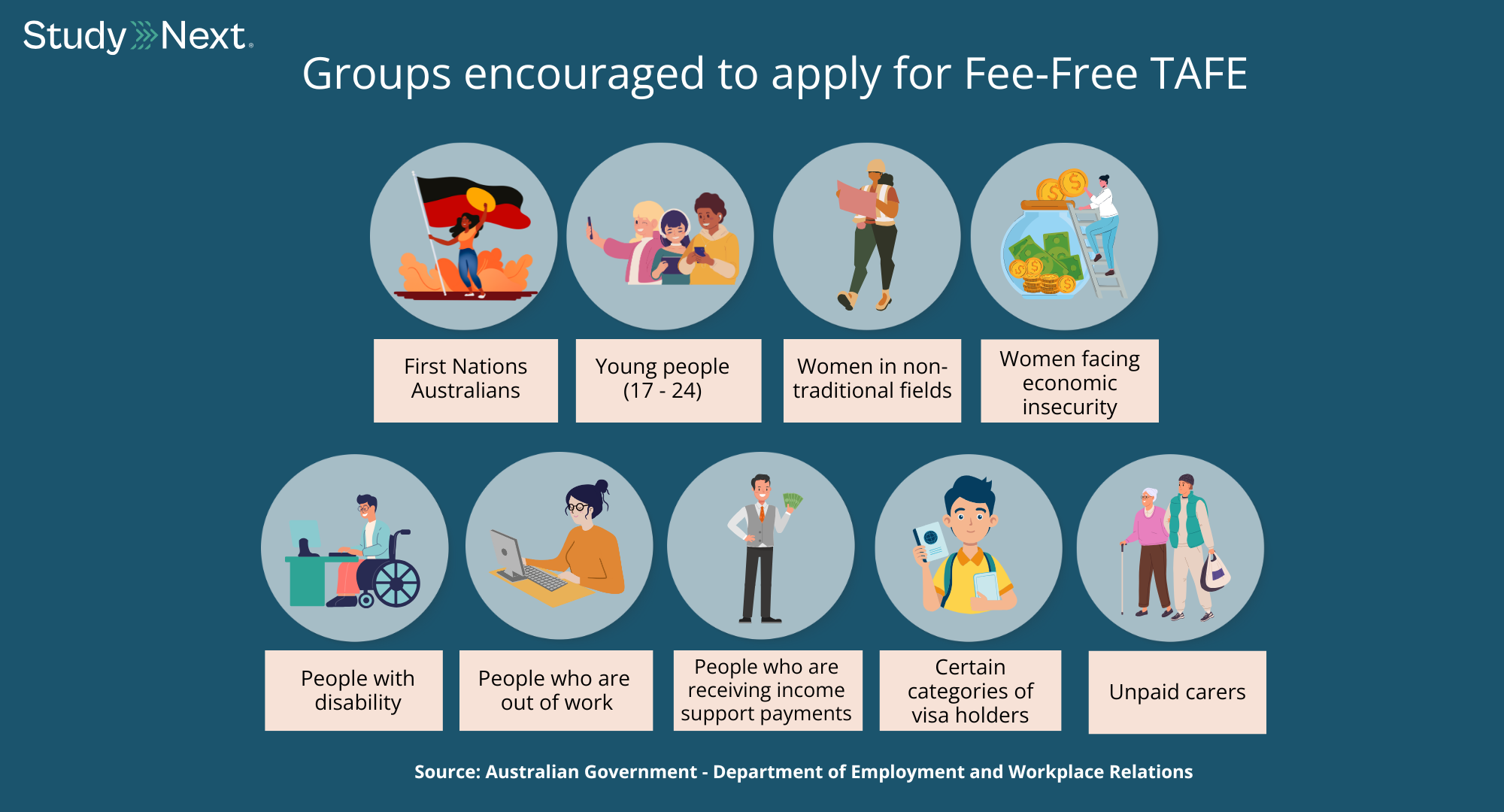
If you’re looking for a way to upskill or gain knowledge in a new field without worrying about cost, studying a free short course can be a great way to achieve your learning goals.
In this article, we explore where you can find free short courses, why they’re worth considering and how they differ from paid short courses. You’ll also learn common steps to enrol and how to make the most of your free course.
Where to find free short courses in Australia
Free short courses are available through a wide range of sources, such as government-funded programs, universities, businesses and online learning platforms. These providers offer a wide range of short courses that are designed to be widely accessible.
Learn more about these options below:
Government
The Fee-Free TAFE program is a collaborative initiative between the Australian Government and state and territory governments, offering diverse tuition-free courses. These courses often focus on areas experiencing skills shortages, such as clean energy, healthcare and construction, to help you develop in-demand skills in high-priority industries and improve your job prospects.
Australian citizens and selected visa holders are encouraged to take these government-funded short courses. To address local workforce needs, the following groups are highly encouraged to enrol:

TAFE’s free short courses are managed by state governments, hence their eligibility criteria and course availability can vary across regions. For example, the Northern Territory prioritises fee-free courses in sectors like business, creative industries and sovereign capability. On the other hand, New South Wales focuses on industries such as financial and insurance services, manufacturing and mining. These differences reflect the unique workforce needs of each area, which is why the courses offered may differ.
Keep in mind that while tuition fees are covered by this initiative, there may be additional costs associated with enrolling in a fee-free TAFE course. Be sure to check individual course details for more information.
Educational institutions
Many universities in Australia offer free short courses designed to help enhance your knowledge and skill set. For example, the University of Technology Sydney (UTS) offers free short courses that are available to anyone interested in experiencing UTS’s postgraduate online learning. These self-paced courses range from two to 15 hours and can be completed 100 per cent online at your convenience. Some of the courses you can study include Ethical Leadership, Introduction to Entrepreneurship and Journey Through Data.
Some universities also collaborate with massive open online course (MOOC) providers to host their courses. For example, the University of New South Wales (UNSW) works with Coursera and Open Learning, while the University of Queensland (UQ) and Curtin University work with edX.
These platforms usually require you to create a free account to enrol in these courses. While many courses are free to complete, giving you access to lectures and ungraded activities, obtaining graded assignments and certificates typically requires a paid subscription. However, if your intention is to learn without any cost or pressure, taking a course with your free account allows you to gain valuable knowledge from top institutions without paying anything.
Business organisations
Many business organisations also offer upskilling opportunities through free short courses on their platforms. Microsoft, for example, offers various free courses for you to learn how to leverage their product offerings in your business. These courses cover subjects like application development, artificial intelligence (AI), data management and security. You can track your progress and achievements by signing in or creating a profile on Microsoft.
Below are some courses you may find interesting:
Discover Microsoft AI for Leaders in Sustainability
This beginner-friendly, three-hour course explores how to incorporate Microsoft AI into your organisation to address sustainability challenges, support green initiatives and enhance resource management. You’ll learn about Azure AI Services, AI-powered solutions and hear success stories from leaders in energy, natural resources and mobility. This course also teaches you how to build frameworks that drive business value, foster an AI-ready culture and empower your organisation to scale AI solutions responsibly in sustainability initiatives.


This course helps sustainability leaders access essential insights and resources to implement AI effectively in their organisations. The program covers strategic approaches, responsible AI practices and tools designed to support sustainability goals. Real-world examples demonstrate how AI can advance environmental and business objectives.
- Drive sustainability with AI: Learn how to integrate Microsoft AI into your organisation to tackle sustainability challenges, improve resource management and support green initiatives with real-world use cases.
- Build an AI strategy for sustainability: Develop frameworks to create business value, adopt an AI-ready culture and empower your organisation to scale AI solutions responsibly in sustainability projects.
- Leverage Microsoft tools and expertise: Explore Azure AI Services, AI-powered solutions and success stories from leaders in energy, natural resources and mobility to accelerate your organisation’s sustainability goals.
Discover Microsoft AI for Leaders in Finance
In this three-hour course, you’ll explore how AI can reshape financial services through real-world examples. You’ll also gain insights into ethical AI principles, governance and secure deployments for financial services, helping you plan AI adoption, build an AI-ready culture and empower teams for innovation.


This course provides financial services leaders with the tools and knowledge to successfully adopt AI within their organisations. It covers key resources, strategic approaches and responsible AI practices, ensuring alignment with industry standards. Additionally, it highlights real-world finance use cases to demonstrate the transformative potential of AI in the sector.
- Unlock AI in finance: Discover how to integrate AI into financial services through real-world use cases and strategies for industry challenges.
- Build an AI-driven organisation: Learn to plan and scale AI adoption, create an AI-ready culture and empower teams for innovation.
- Adopt responsible AI practices: Gain insights into ethical AI principles, governance systems and secure implementations for financial services.
Transform your Business with Microsoft AI
This course is designed to help you plan, strategise and scale AI initiatives effectively. It delves into the integration of Azure AI Services, Microsoft Power Platform and AI Copilot applications to deliver custom AI solutions and revolutionise your business processes. You can typically complete this course in two and a half hours.


In this course, business leaders will find the knowledge and resources to adopt AI in their organisations. It explores planning, strategising and responsibly scaling AI projects.
- Build an AI-ready organisation: Learn how to plan, strategise and scale AI projects effectively while fostering an AI-ready culture for long-term success.
- Leverage cutting-edge Microsoft AI tools: Discover how to integrate Azure AI Services, Microsoft Power Platform and AI copilot applications to create custom AI solutions and transform your business processes.
- Embrace responsible AI practices: Adopt responsible AI principles, governance systems and frameworks to ensure ethical and sustainable AI implementation aligned with your organisation's goals.
Amazon Web Services (AWS) offers more than 600 free short courses online to enhance your digital skills across fields like machine learning and AI, data analytics and cloud essentials. You’ll need to create a free account to access these courses. As a free user, you can get limited access to exam preparation material and game-based learning tools.
AWS also offers a wide range of free short courses with certificates available upon completion. Some courses include the following:
This 50-minute course covers the basics of generative AI, its key terminology and how to leverage it for business value. You’ll also be introduced to AWS’s generative AI services and strategies to choose the right tools for your organisation’s needs. This course includes 18 videos to guide your learning.


This course explains generative AI's foundational concepts and terminology and how to drive business value with generative AI. You are introduced to AWS generative AI services and strategies to choose services best suited for your enterprise's use case. Lastly, in this course, you learn the factors you need to consider to get started with generative AI in your enterprise.
- Learn at your own pace.
- No prerequisites required.
AWS Cloud Essentials for Business Leaders
In this two-hour course, you’ll learn the fundamental concepts of cloud computing and how adopting a cloud strategy can help your company achieve business goals. It delves into the benefits and possibilities of cloud computing. The course also introduces concepts like security and compliance, enabling better collaboration between business professionals and IT teams.


In this course, you will learn the fundamental concepts of cloud computing and how a cloud strategy can help companies meet business objectives. It explores the advantages and possibilities of cloud computing. It introduces concepts such as security and compliance to help facilitate better discussions with line of business (LOB) professionals, information technology (IT) LoB, IT leaders, and executives.
- Learn at your own pace.
- No prerequisites required.
Online learning platforms
Online learning platforms, such as Udemy and Coursera, provide an accessible way for Australians to find free short courses in business, finance, marketing, communication and more. These platforms usually host diverse courses from universities, TAFE providers and professional organisations. Many courses are also self-paced, offering great flexibility that’s especially valuable if you’re balancing a full-time career with personal commitments. However, keep in mind that some courses may require a paid subscription to access all content or features.
These platforms allow you to explore various topics without pressure, making them ideal if you want to try new interests before committing to a formal qualification. Whether you want to boost your employability or pursue personal growth, online learning platforms provide an easy way to start learning at any stage of your life.
Differences between free and paid short courses
Free short courses can be a great starting point to delve into a new field, while paid short courses often provide more comprehensive learning experiences and resources. Both options offer valuable learning opportunities, and the choice between studying a free short course or a paid one ultimately depends on your goals. While cost is the most obvious difference, there are other factors that distinguish free courses from paid ones. Explore these differences below:
| Free short courses | Paid short courses | |
|---|---|---|
| Access | Typically beginner-friendly with no entry requirements | May require specific qualifications or other entry requirements |
| Commitment | Generally low commitment, making them ideal to explore new interests | Typically demand higher commitment as you would have clear intent in pursuing them |
| Structure | Many are self-paced, offering greater flexibility | Usually are more structured with schedules and set deadlines |
| Resources | Commonly offer foundational videos and reading material | Often offer more comprehensive material and access to experienced mentors |
| Certification | May be included, typically available for a fee | Usually included, with some courses offering formal university credit |
| Credibility | Great way to show initiative for personal and professional growth | Typically carry more credibility and are more widely recognised by employers |
Free short courses are ideal if you prefer a low-pressure, flexible learning format and want a budget-friendly way to upskill. On the other hand, paid short courses may be better if you’re looking to get more in-depth knowledge, earn a recognised credential for career advancement and value structured learning to keep yourself motivated.
Paid short courses also cover a wide range of topics, including business analytics, AI and leadership, which are some of the skills in great demand across various industries. Many of them are offered by Australian universities and professional organisations, ensuring that your qualification is accredited if eligible.
For example, if you’re thinking of enhancing your analytical skills, you can consider the Statistical Analysis for Decision-Making course at CPA Australia. This four-hour online course will teach you how to categorise and organise data for analysis. You’ll also learn key concepts in probability and how they can be applied in organisational decision-making. Upon completion, you’ll receive a CPA Australia micro-credential and digital badge, which can be featured on your LinkedIn, resume or email signature.


This course will teach you how to categorise and organise different types of data for analysis. You will learn about the fundamental concepts in probability and how they can be used in organisational decision-making.
You will also learn about various sampling strategies that can be used to infer conclusions about a population, calculating confidence intervals for determining the range of values in which a true population value is likely to be found, and hypothesis testing to explain why something has happened or predict what might happen in the future.
This course features examples and real-world applications provided by industry experts and financial leaders to embed the learning and bring the content to life. It will give you the requisite tools and techniques that are increasingly important in modern finance roles.
This highly interactive course, focusing on various industries, includes activities, videos and simulations to keep you engaged.
- Earn recognised credentials: Boost your career with a CPA Australia micro-credential and digital badge from Credly, showcasing your expertise in statistical analysis on LinkedIn, your CV or email signature.
- Develop advanced statistical skills: Master data classification, probability concepts, sampling techniques and hypothesis testing to analyse data effectively and drive organisational decision-making.
- Flexible, practical learning: Study online in a self-paced format with interactive activities, simulations and real-world examples designed for finance and accounting professionals.
About CPA Australia micro-credentials
CPA Australia’s micro-credentials are based on technical and non-technical competencies. CPA Australia’s partner, Credly, will provide you with a digital badge for successfully completing the assessment. Your digital badge demonstrates your capability and achievement and can be placed on your LinkedIn profile, digital CV or email signature.
If you’re interested to learn about generative AI (GenAI), you can enrol in the University of Melbourne’s Generative AI for Business course, which focuses on how to leverage this technology to support growth, innovation and a competitive edge. Conducted as a two-day course in person, you’ll learn how to design AI-integrated business strategies that align with organisational goals.


Utilise Generative AI to drive growth, innovation, and a competitive edge.
65% of organisations are already regularly using Generative AI in at least one business function (McKinsey, 2024).
Used wisely, Generative AI has the potential to drive growth, nurture innovation and provide your organisation with a competitive edge.
Led by top educators from Melbourne Business School and the University of Melbourne, develop a deeper understanding of the fundamentals of Generative AI to unlock innovative applications and address the associated risks.
At the completion of the program, you will have your own practical business strategy that outlines how to integrate Generative AI with your broader business goals, ideas for where to invest, and execution plans to ensure its responsible use and long-term value.
Join the two-day program to discover the tools, and technologies to better harness the power of Generative AI in your business.
If you’re planning to move up the career ladder and step into a leadership role, you can find many short courses that focus on building leadership capabilities, such as Queensland University of Technology (QUT)’s online Business Fundamentals: Managing People course. Spanning over 10 hours, the course equips you with the tools, techniques and insights to excel in people management. It is designed for current managers, team leaders, professionals transitioning into managerial roles and those wanting to understand the complexities of managing diverse teams in modern workplaces.


This course on Managing People offers a comprehensive exploration of managers' evolving roles and functions, emphasising the importance of relational approaches and impactful conversations. It is designed to provide you with the tools, techniques and insights needed to excel in managing people, making it an invaluable addition to your professional development journey. Join QUT to transform your management skills and make a lasting impact on your organisation.
Key benefits:
- Learn on-demand: Access course materials online for 12 months and complete the modules whenever possible.
- Industry-relevant content: Gain practical knowledge and skills co-designed by industry experts.
- Career advancement: Enhance your professional profile with a Certificate of Participation upon completion.
- Flexible learning platform: Study seamlessly via Canvas, QUT's online platform.
- Quick access: Start your learning journey within one business day of enrollment.
Earn a Digital Badge of Completion
Participants who complete this program will receive a Digital Badge of Completion, a modern, verifiable credential that can be easily shared on LinkedIn, personal websites, email signatures and digital portfolios. This badge highlights your achievement and skills, providing a trusted and accessible way to showcase your expertise.
To explore more short courses that can boost your skills, check out this article.
4 steps to enrol in a free short course
To enrol in a free short course, start by identifying your goals, then search for free courses that align with those objectives. Once you find your course, review its details carefully before enrolling. Here’s a simple step-by-step guide
- Identify your goal: Determine what learning outcomes you hope to achieve after completing a short course, whether it’s to improve your career prospects, learn a new skill or explore a personal interest. This can help you narrow down courses that match your learning needs.
- Search for relevant courses: Explore various free short courses offered by universities, government programs, business websites and online learning platforms. Use filters like “free” to find short courses that fit your interests and budget.
- Review course details: Once you find the right course, check its eligibility criteria and application deadline to ensure that you’re able to enrol. You should also consider the course duration and learning format to make sure it fits in your schedule, especially if you’re pursuing the course with a full-time job. If you’re looking to get a certificate after completing the course, check whether it’s offered in the free course.
- Sign up for the course: After enrolling, be engaged throughout your learning experience by participating in course activities and completing assignments, even if they’re optional. Use productivity tools to keep you on track and look for opportunities to apply your new skills and knowledge in real-world situations.
Why study a free short course?
Studying a free short course offers numerous advantages, including venturing into new interests and advancing your career. It allows you to build new skills or boost existing ones with zero or minimal financial investment, often at your own pace.
Here’s why you should consider studying a free short course:
Explore before committing to a full qualification
Studying a free short course allows you to explore a new interest with minimal risk. This is ideal for recent graduates or working professionals wanting to change careers. These courses often have no entry requirements, making them accessible to beginners regardless of their academic background. This can help you determine if pursuing further qualifications in a new field is right for you.
Upskill for professional growth
Free short courses offer a convenient way for you to enhance your expertise or learn new skills to elevate your career. These courses help you gain practical skills in areas such as business, entrepreneurship and project management, which are often transferable across industries. Obtaining these skills can help you become more competitive in the job market and show employers that you’re committed to continuous professional development.
Enjoy flexible learning
Many free short courses are online and self-paced, allowing you to study whenever and wherever suits you best. They tend to be low-pressure as many of them don’t have exams or deadlines unless you choose to pay for graded assessments. With courses ranging from just a few hours to several weeks, it’s easy to fit learning around your work and personal obligations. You’ll be able to upskill without having to make major lifestyle adjustments.
Discover your preferred learning style
By taking multiple short courses, you can explore different learning formats without financial risk. While many courses are delivered online, some offer face-to-face or hybrid options with more structured schedules. This can give you insight into what you’ll experience should you decide to pursue a full qualification. For example, if you’re a working professional who completed your undergraduate degree on campus, you can try an online short course and see if the learning format fits your schedule better for future postgraduate study.
Learn from reputable Australian institutions
Many free short courses are offered by respected providers across universities, TAFE institutes and registered training organisations, ensuring high-quality content. Learning at local institutions also means the content is tailored to Australian industry standards and regulations, giving you relevant and practical knowledge to grow your career in this country.
How to make the most out of your free short course
To get the most out of your free short course, it’s important to understand your intentions, create a study plan depending on the length of the course and actively engage with the learning material. Since free courses usually come with no pressure or financial commitment, it can be easy to feel disengaged. Below are some tips to help you stay focused during your learning experience:
- Set a clear intention to stay motivated. Understanding why you’re taking the course, whether it’s to upskill for work or test the waters in a new field, can help you remain engaged throughout the course.
- Create a study schedule to keep you organised. If you’re studying a self-paced short course, it may be easy to procrastinate since you can study whenever you want. Set aside a specific amount of time each week to study so you can maintain momentum.
- Dedicate a study space that can help you stay focused and comfortable, especially if you’re studying at home. Keeping your space free of clutter and your notes organised in one place can help you absorb the material better and improve your learning experience.
- Actively engage with the content of your short course by taking notes, summarising and quizzing yourself. This can help you retain information better and deepen your understanding rather than just passively watching videos and reading course material.
- Use productivity tools to keep you on track with your study goals. There are many digital tools that can help organise your notes, remind you of upcoming deadlines and even block distractions when you’re studying.
- Connect with other learners by joining online forums and discussion groups related to your course. Engaging with others can enhance your understanding of the subject, keep you motivated and provide valuable support when you’re stuck or need a fresh perspective.
- Apply what you learn without waiting for the course to be over. Many short courses are designed to give you skills that can be put into practice immediately. Practising what you’ve learned in real life reinforces your new knowledge and helps you see how your studies have a real-world impact.
Upgrade your skills with a short course
If you’re looking to explore a new area of interest or upskill for work, pursuing a short course is an efficient way to achieve your goals quickly. Free short courses allow you to enhance your knowledge without any financial burden, while paid courses often offer you more credibility and in-depth knowledge. Ready to start your learning journey? Explore diverse short courses offered by top institutions across Australia.























